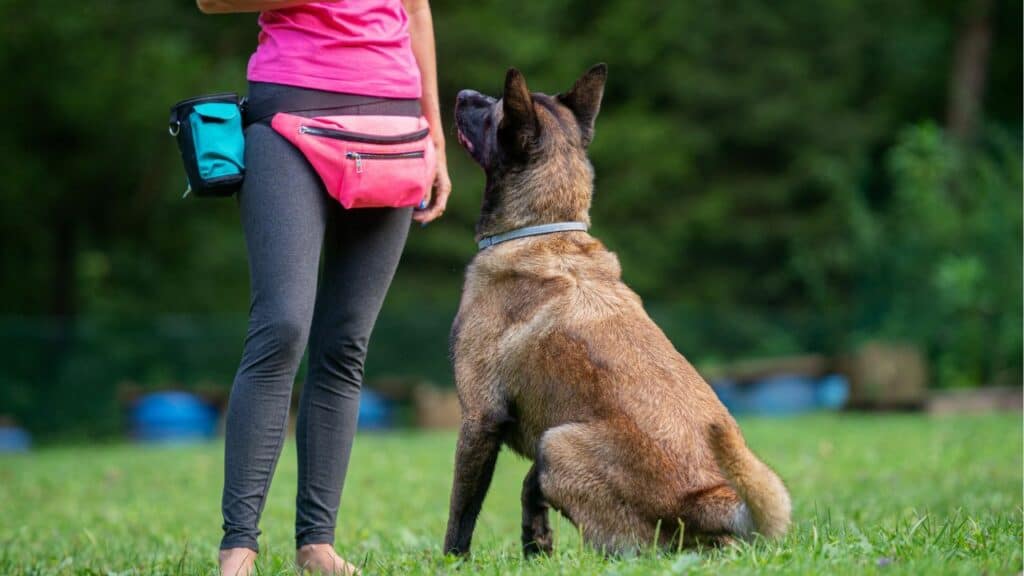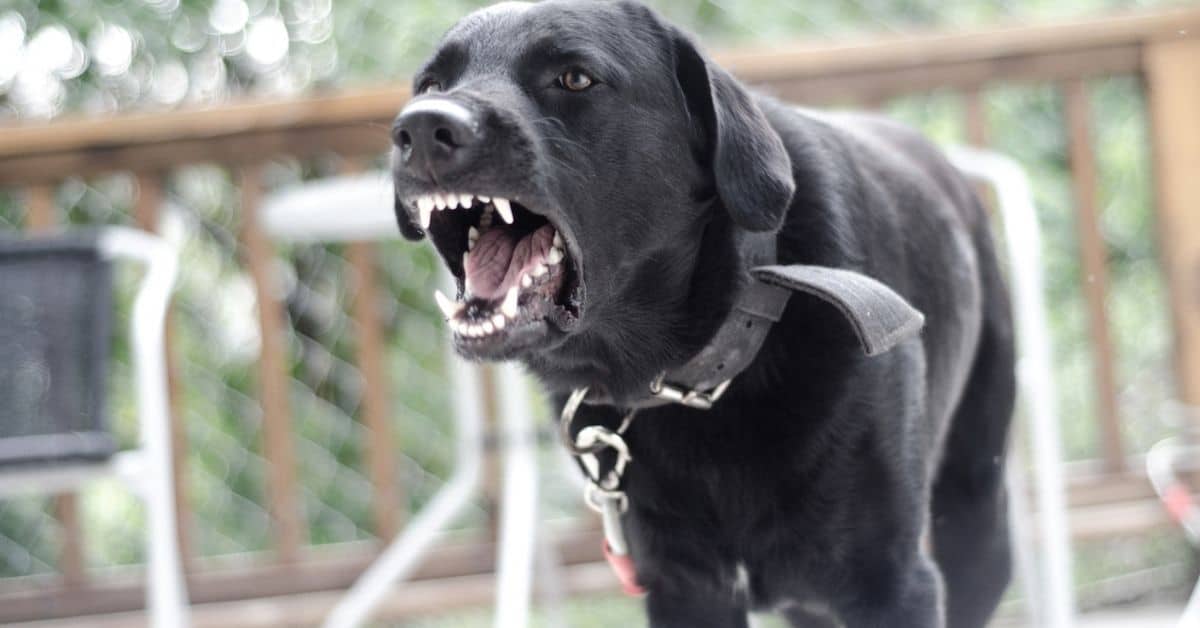One of the many vocal communication methods used by dogs is barking.
However, if your dog barks a lot or for an extended time, it may irritate you and your neighbors and also be a sign of more severe problems.
People frequently enjoy hearing their dog bark because it warns them when strangers are approaching their home or lets them know when the dog needs or wants something.
However, a dog may start with excessive barking or even compulsive barking. You want to stop this immediately and teach your dog, what to do instead.
Because barking can serve various purposes, you should identify its origin and purpose before attempting to address the issue.
Acting as soon as possible is crucial to stop familiar barking or the causes of barking from becoming more serious.
As you want to know the answer to the question “how to stop a dog from barking”, let’s dive more into the reasons for barking and we’ll reveal to you, how to get dogs to stop barking.
Why Do Dogs Bark?
You shouldn’t anticipate your dog being bark-free.
As mentioned before, most dogs bark, and this can be totally normal.
That is just as unreasonable as expecting a child never to speak.
Some dogs do, however, bark more frequently.
Discover what’s making dogs bark to overcome the problems in your home and most important, stop compulsive barking.
Good and important to know is: You can’t treat the barking issue before diagnosing why your dog is barking.
1. Territorial Barking / Protective

Your dog sees nearby people or animals as belonging to him, so your dog will frequently bark excessively to mark his territory.
The barking frequently becomes louder as the threat approaches.
During this barking, your dog will appear alert and potentially violent.
When people, other dogs, or other animals enter or approach their territory, dogs may bark excessively in response.
That’s mostly the point where dogs don’t stop barking anymore.
If dogs bark for territorial reasons, you may need some time to find out what their territory is.
Normally, your dog’s territory includes the areas close to his home and the places your dog eventually explores, including your car, the paths your dog takes while walking, and other spots where your dog spends a lot of time.
That includes places that have special meaning to you or have visited.
Try to figure out those places to make your dog stop barking.
2. Alarm/Fear
Some dogs will bark in response to sounds or things that frighten them or catch their attention.
This kind of barking is also called alarm barking.
Alarm barking can happen anywhere and is not just confined to their territory.
When your dog starts with alarm barking, your dog’s ears are pushed back and his tails are tucked in.
Your dog may be barking in response to an alarm. That can be if your dog barks excessively at any sounds and sights, regardless of the circumstance.
Territorial barking differs from alarm barking in that dogs can bark anywhere at sights and sounds instead of just defending nearby areas like homes, yards, and vehicles.
3. Boredom/Loneliness
As we all know, dogs live in packs.
When dogs are left alone for extended periods, whether at home or in the garden, dogs can become bored or sad and frequently bark.
Even more, in this situation, dogs might urinate, chew, dig, defecate, howl or try to escape.
In this case, you don’t need to focus on your dog stop barking, you better find ideas on how you can stop the alternative behavior caused by boredom and loneliness.
What can you do, so that your dog isn’t bored and lonely anymore?
We discuss this point later on.
4. Greeting or Play

When greeting people or other animals, dogs frequently bark.
It is typically a happy bark, supported by tail swishing and, on occasion, jumping.
It may be a greeting bark when your dog sees people or other dogs and barks excitedly with a relaxed body and wagging tail.
Dogs sometimes make vocal greetings to humans and other animals.
5. Attention Seeking
Dogs often bark to express their desires to go outside, play, or receive treats.
Take this kind of barking seriously, barking doesn’t always need to be a problem.
Learn to understand your dog’s greeting barking and don’t try to make your dog quiet in this situation.
6. Separation Anxiety/Compulsive Barking
Dogs with severe anxiety often bark too much when left alone.
They often also display behaviors like pacing, destructiveness, depression, and incontinent elimination.
Some people appear to bark compulsively for no apparent reason other than the pleasure of hearing their voices.
They also tend to engage in patterned behavior, such as running in circles or along a fence.
Only when the dog’s owner is not home or when the dog is left alone does it bark excessively due to separation anxiety.
There is typically more than one symptom present when dealing with separation anxiety, including pacing, destruction, elimination, depression, and other signs of distress.
7. Illness or Injury
A dog’s distress barks are low and muffled, often accompanied by whingeing, and can sound breathy, as if the dog is panting.
A dog may bark to express that pain when it is in pain.
Please consult a vet to rule out any underlying health issues before attempting to treat your dog’s barking.
8. Compulsive Barking
Barking Incessantly is common for dogs, some dogs bark excessively, almost like a broken record.
These dogs also move repetitively.
For example, a dog who is obsessively barking may pace in his yard or run back and forth along the fence.
How To Stop A Dog From Barking Excessively?
The first step in reducing the amount of barking your dog does is to identify the type of bark your dog is exhibiting at the moment.
The following set of questions is designed to assist you in identifying the type of excessive barking your dog is engaging in so that you are better equipped to deal with the issue.
As you read the following information on the various types of barking and the treatments available for each, give some thought to the answers you came up with to these questions.
What is causing your dog to bark? When exactly does the barking start, and where does it take place?
What is the intention of barking?
Before beginning behavioral modification or drug therapy to reduce barking, one must rule out the medical causes of the behavior.
A dog’s owner should not expect a quick fix or that their dog will ever stop barking completely because teaching a dog to bark less takes time, and the dog will never discontinue barking completely.
Always seek the assistance of a “certified professional dog trainer” when dealing with behavioral issues with dogs.
More physical activity, mental concentration, and social contact with others can reduce the desire to bark.
The best course of action for owners in this situation is to seek the guidance of an experienced trainer or a veterinary behaviorist.
Whenever it tends to come to barking that’s also socially aided, it is typically best to either keep dogs inside when there is barking going on outside or play loud music to drown out the.
Barking brought on by frustration can be significantly reduced if your dog receives obedience training that teaches them to control their impulses.
It is to a dog’s advantage to be prepared to wait, sit, and stay and to be rewarded with pleasurable dog-friendly pursuits such as going for walks and interacting with other dogs after completing these training exercises.
A veterinary behaviorist may need to be consulted regarding this condition as well.
Treating separation anxiety in your dog is necessary to control the barking associated with separation anxiety.
For further information, we ask that you contact your veterinarian.
Nothing Helps: Why Won’t My Dog Stop Barking?
In addition to the abovementioned methods, start organizing your space to lessen the triggers that cause your dog to bark in addition to the methods mentioned above.
It’s beneficial to teach your dog other behaviors besides barking.
That may be the solution to stop your dog from barking.
If you know that your dog barks too much whenever a package is delivered, you can train it to run to another part of your house when the doorbell rings to receive rewards (instead of your dog rehearsing the barking behavior at the door.)
Have just a family member or friend ring your doorbell (or use a doorbell recording online) to begin teaching this new behavior.
When the doorbell rings, grab your dog’s attention with a high-value treat and direct them quickly and enthusiastically in the direction you want them to go.
Give your dog plenty of expensive treats once you arrive there.
Throughout several practice sessions, repeat this interaction numerous times.
With some practice, your dog will discontinue barking when packages are delivered and instead anticipate running to that part of the house farther from the front door to get treats.
Anti-Bark Dog Collars: Should You Use Them To Stop Barking?
Several products on the market claim that dogs can immediately silence barking and help with the problem.
The corrections delivered by collars for your dog can be audible or ultrasonic.
Collars that spray citronella are usually effective, but some dogs learn to wear them in a way that causes them to run out of spray.
Bark-activated water sprayers or noisemakers can occasionally halt a dog from barking.
When a dog barks, an anti-bark collar gives off a smell that makes the dog want to stop.
These are not the first choices available for addressing a problem with excessive barking.
Other off-collar devices may be effective if your dog barks in a specific location.
When they detect barking, bark-activated water sprayers or noisemakers turn on and start spraying water on dogs or make a loud noise.
These can occasionally halt a dog from barking in a specific area, but they are most effective when you are home to reward your dog when he ended barking.
That supports teaching your dog the behavior you want.
Does A Certified Professional Dog Trainer Help?

It is impossible to provide universal expert behavioral advice about any dog.
Teaching a dog what you want from them through positive reinforcement obedience training is an excellent place to start.
There are different training techniques that can help your dog.
Understanding why your dog is barking is essential, as is moving away from the stimulus that may be arousing your pup.
A counterconditioning and desensitization protocol, combined with ethology and obedience training, would be beneficial.
Give it a try and go in one training session with your dog.
If it’s helpful, start visiting more training sessions to work on the dog’s behavior.
Many dog owners feel bad to get help but it is absolutely normal and it really helps you with the situation.
If you’re still having problems or have a one-of-a-kind situation, contact someone like Certified Fear-Free Trainers and Behaviorists.
To Prevent Is Key When It Comes To Stop Barking
Dogs will never outgrow their natural tendency to bark because it is a normal part of their behavior.
Barking can be a helpful tool when figuring out what causes your dog fear.
If dogs bark continuously, it means they are trying to communicate you that they have a requirement that has not been fulfilled or that they require removal from a frightening circumstance.
It doesn’t matter if you’ve recently acquired an adult dog through adoption or if this is your first week with a new puppy; if you keep your dog occupied and give it plenty of exercise, it will help reduce barking and prevent from practicing it.
Please take note of the stimuli that cause your dog to bark, and then use the strategies presented here to reduce the number of noise dogs make.
Barking is a natural canine behavior, and young puppies won’t outgrow it.
As we already discussed before, there isn’t always a solution to your dog’s barking, because sometimes, it’s just natural.
However, you can take constructive steps to reduce your dog’s barking and teach him alternative ways to communicate with you and other people.
The sound of your dog’s barking can be a beneficial indicator in determining what triggers their anxiety or makes them uncomfortable.
Always remember that it is your responsibility as a dog owner to look out for your dogs best interests, including ensuring that they are never exposed to anything that could cause undue anxiety.
If your dog is barking continuously, it means that he is trying to communicate with you that he has a requirement that is not being fulfilled. Or it can mean that your dog requires removal from a terrifying or overwhelming situation.
Do Those Tips Help Your Puppy?
Barking is a natural part of a dog’s behavior and a puppy, and you should expect your puppy to grow into a barking dog.
It is unrealistic, if not unfair, to believe you can train your dog to discontinue barking, but you, your family, and your neighbors will be happier if you can.
Every waking moment, your new puppy is learning!
Every interaction you have with your puppy will be a form of training from the moment you meet.
Housetraining, household manners, and social experiences are all types of training you’ll do with your puppy from the start.
In some cases, puppies will begin formal training before going to their new home, such as housetraining, greetings, and how their actions can lead to rewards.
The most important about puppies to say is, that you shouldn’t just focus to stop your puppy from barking, but better focus on training your puppy in general.
What Not To Do When Dogs Bark
You should never train your dog to bark in response to noises such as people or animals walking by, birds outside your house, kids in the park, or doors banging by asking, “Who’s there?.
Instead, ignore both the sounds and how your dog responds to them.
If you do this, the dog will associate the sound of the doorbell with the behavior of barking.
You need to be consistent in everything you do!
If your dog barks because he is scared or worried, you should never punish him unless instructed to do so by “Certified Applied Animal Behaviorist” or a “veterinary trainer.”
This may make him feel bad and cause him to bark more.
Use a muzzle on your dog only when you are not watching him or for a long time.
When you force your dog to wear muzzles, your dog will never eat, drink, or pant to cool for an extended period.
Under no circumstances should you use a piece of string, wire, ropes, or any other method to secure your dog’s nose.
Not only is this hurtful, but it is also dangerous and cruel.
Before You Go…
Now you know how to stop your dog from barking.
If you want to learn more, read the following articles too!


